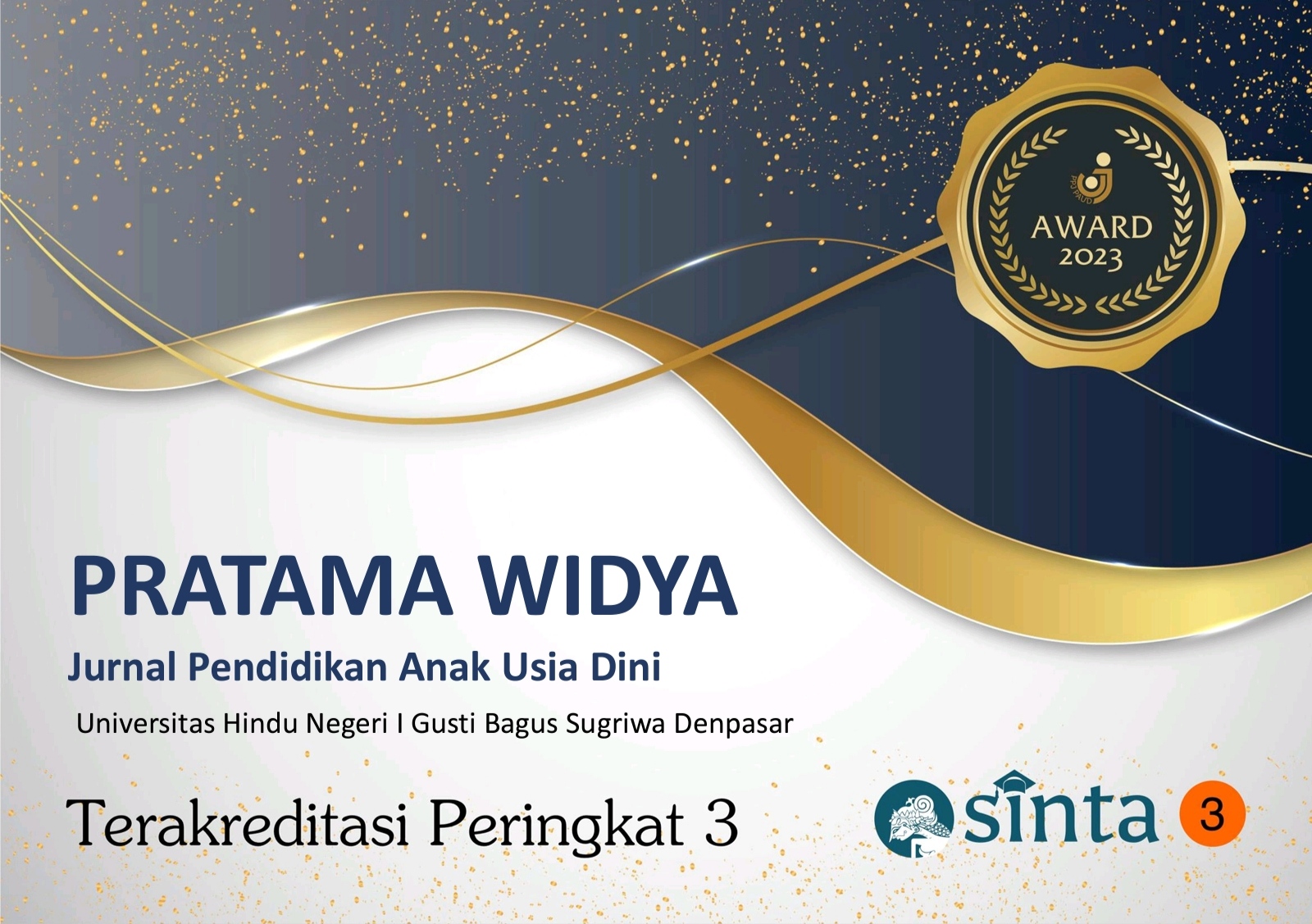PENGEMBANGAN E-MODUL AJAR BERBASIS FLIPBOOK PADA MATA KULIAH PROGRAM PENGEMBANGAN KELOMPOK BERMAIN ANAK USIA DINI
PENGEMBANGAN E-MODUL AJAR BERBASIS FLIPBOOK PADA MATA KULIAH PROGRAM PENGEMBANGAN KELOMPOK BERMAIN ANAK USIA DINI
DOI:
https://doi.org/10.25078/pw.v9i1.3529Kata Kunci:
E-modul, FlipbookAbstrak
Meningkatkan pengetahuan mahasiswa diperlukan ketersedian sumber belajar yang memadai untuk menunjang proses pembelajaran. Pengembangan bahan ajar berbasis kvisoft flipbook adalah salah satu komponen penting untuk menarik perhatian mahasiswa, mudah dipahami dan dapat diakses dimanapun sehingga mahasiswa bisa belajar mandiri dan mendapatkan kualitas hasil belajar yang baik. Tujuan penelitian ini untuk mengetahui proses rancangan pengembangan e-modul berbasis flipbook, kelayakan e-modul, dan mengetahui respon mahasiswa terhadap e-modul ajar mata kuliah program pengembangan kelompok bermain anak usia dini. Metode penelitian ini merupakan pengembangan Reseach Dan Development menggunakan model ADDIE yang dalam pelakasanannya menggunakan 5 tahapan yaitu: analisis, rancangan, pengembangan, penerapan dan evaluasi . Uji coba terbatas dengan sejumlah 50 orang mahasiswa semester 3 PGPAUD UNG. Berdasarkan hasil penilaian validasi materi dan ahli media mendapatkan skor rata-rata 98,89% dengan ketegori interpretasi “sangat kuat” dan lembar repson mahasiswa memperoleh skor rata-rata sebesar 89,45% dengan ketegori interpretasi“sangat kuat”. Oleh karena itu pengembangan e-modul berbasis flipbook pada Mata Kuliah Program Pengembangan Mata Kuliah Kelompok Bermain Anak Usia Dini sangar baik digunakan sebagai bahan ajar untuk proses pembelajaran dan dapat digunakan oleh kalangan luas
Referensi
Afrianti , Reny Eka Nur, and Abd. Qohar. "Development of Contextually Based E-Modules on Class XI Linear Program Material." Journal of Mathematics and Science Education, vol. 7, no. 1, 2019, p. 22, doi:10.25273/jems.v7i1.5288.
Anandari, QS, Kurniawati, EF, Piyana, SO, Melinda, LG, Meidiawati, R., & Fajar, MR (2019). Development Of Electronic Module: Student Learning Motivation Using The Ethnoconstructivism-Based . 06 (02).
Arnila, R., Purwaningsih, S., & Nehru. (2021). Development of Stem-Based E-Modules (Science, Technology, Engineering and Mathematics) on Materials . 5 (1), 551–556.
Arsal, M., Danial, M., & Hala, Y. (2019). Development of E-Module Learning Media Mate Ri S Ist Em P Ere Dar An D Direction in the Xi Mipa Class at Sman 6 Barru. Journal of Physics Education , 4 (1), 1–15.
Dahlan, A., Irawati, H., & Saifuddin, MF (2018). Analysis of Needs for Development of Teaching Materials for Introductory Profession Courses for Biology Teachers in Biology Education, Ahmad Dahlan University, Yogyakarta. Analysis of Needs for Development of Learning Materials Program for Introductory Profession of Biological Teachers in Biology . 7 , 96–99.
Diana, PZ, & Wirawati, D. (2021). DEVELOPMENT OF LEARNING COURSE E-MODULES . 0 .
Gunamantha, IM, Studi, P., Basis, P., & Ganesha, UP (2021). Flipbook Maker for Sub-theme Jobs Around Me Class IV SD / MI Basic Education Study Program, Ganesha Education University . 5 (2), 165–174.
Harahap, NJ (2019). Ecobisma Journal [D Vol 6 No. 1 Jan 2019 ] . 6 (1), 70–78.
Hardiyanti, T., Amilda, A., Ulfa, K., Wicaksono, A., Setyabudi, D., & Sari, LN (2020). Development of Optical KIT Learning Media Based on Guided Inquiry on Students' Cognitive Competencies in Light Material at SMP N 40 PALEMBANG. Proceedings of the 2020 National Seminar on Biology Education , 139–146. http://proceedings.radenfatah.ac.id/index.php/semnaspbio/article/view/529%0Ahttp://proceedings.radenfatah.ac.id/index.php/semnaspbio/article/download/529/338
Herlina, A., & Hadiyanti, D. (2021). Development of a Flipbook-Based Digital Science Learning Module for Online Learning in Elementary Schools . 4 (2), 284–291. https://doi.org/10.31949/jee.v4i1.3344
Hervi, F. (2021). Electronic Module (E-Module) Science with Emotional Spiritual Quotient (ESQ) nuances regarding the Reproductive System in Humans . 4 (3), 370–377.
Indahnya, M., Culture, K., Class, N., School, I. V, Milla, A., Halimatus, S., & Indawati, N. (2021). Cognition: Journal of Primary School Education Research, Development of Electronic-Based Social Science Modules . 1 (2), 64–69.
Lena, LAN, Samiha, YT, Habisukan, UH, Wigati, I., Hapida, Y., & Anggun, DP (2020). Study on the Development of E-Book Teaching Materials. Proceedings of the 2020 National Seminar on Biology Education , 33–40.
Lestari, KD, Agustini, K., & Sugihartini, N. (2019). Development of Project Based Learning Storyboard Teaching Modules for Class XI Multimedia Students at Bali Global Singaraja IT Vocational School . 8 .
Maria, U., Rusilowati, A., & Hardyanto, W. (2019). Interactive Multimedia Development in The Learning Process of Indonesian Culture Introduction Theme for 5-6 Year Old Children . 8 (3), 344–353.
Nita Sunarya Herawati, AM (2018). Development of Interactive Electronic Modules (E-Modules) in Class XI High School Chemistry Subjects. Journal of Educational Technology Innovation , 5 (2), 180–191.
Oktaviara, RA (2014). Development of E-modules with the Assistance of Kvisoft Flipbook Maker Based on a Scientific Approach to Material Implementing the Operation of Word Processing Applications Class X OTKP 3 SMKN 2 Blitar Rhesta Ayu Oktaviara Triesninda Pahlevi. Study, Education Program, Office S, Economic Administration, Surabaya Faculty, State University of Studies, Education Program, Office S, Economic Administration, Surabaya Faculty, State University .
Rambe, K., & Ristiono. (2022). Development of a Smartphone-Based Electronic Module (E-Module) on Human Excretory System Material for Students . 17 (2).
Rohida, L., Sos, S., & Si, M. (2018). Influence of the Industrial Revolution Era 4. 0 for Human Resources Competency . 6 , 114–136.
Sari, DAP, Hidayat, M., & and Wawan Kurniawan. (2019). 1 , 2 , 3 1 . 4 .
Ulfaturrizqiyyah, R. (2023). Inclusive education for early childhood at Durian Emas Purwokerto District Thesis .
Violadini, R., & Mustika, D. (2021). Basicedu Journal . 5 (3), 1210–1222.
Wati, I., Falahudin, I., Habisukan, UH, Islam, U., Raden, N., Palembang, F., & Selatan, S. (2020). Student Intelligence Levels in Palembang's Top High Schools . 1–10.
Wulandari, F. (2020). Utilization of the Environment as a Learning Resource for Elementary School Children (Literature Review). Journal Of Educational Review And Research , 3 (2), 105–110.
Unduhan
Diterbitkan
Cara Mengutip
Terbitan
Bagian
Lisensi
Hak Cipta (c) 2024 Sulastya Ningsih NINGSIH, Febritesna Nuraini, Waode Eti Hardiyanti, Endah Setiyowati

Artikel ini berlisensiCreative Commons Attribution-NonCommercial-ShareAlike 4.0 International License.








